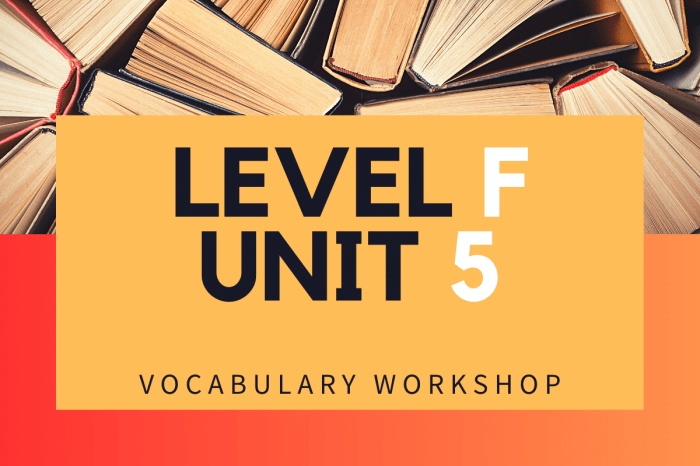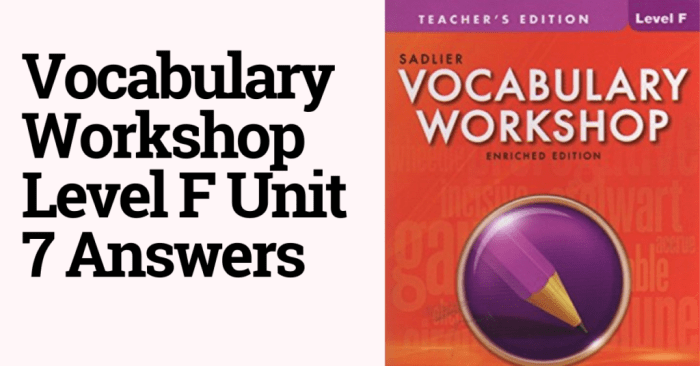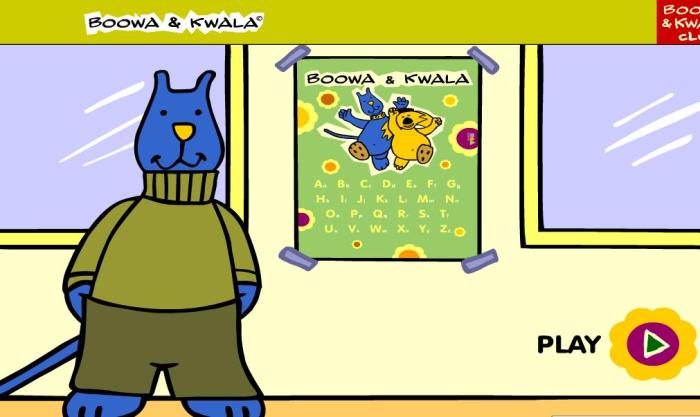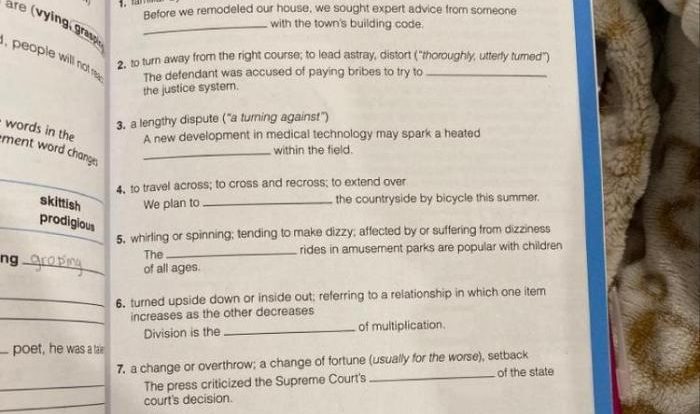Embark on a linguistic adventure with vocab level f unit 5 answers, your comprehensive guide to mastering new words and expanding your vocabulary. This resource provides a treasure trove of words, exercises, games, and more to make learning an enriching experience.
Dive into the world of vocabulary with engaging exercises, real-world applications, and assessment tools that cater to diverse learning styles. Let’s unlock the power of words and elevate your language skills to new heights!
Vocabulary Level F Unit 5
Word List
Word List

Level F Unit 5 introduces a variety of new vocabulary words that are essential for expanding your English vocabulary. These words cover a wide range of topics, from everyday objects to abstract concepts. By understanding and using these words effectively, you can significantly enhance your communication skills.
The vocabulary words in this unit are categorized into nouns, verbs, adjectives, and adverbs. Each word is accompanied by its definition and an example of its usage in a sentence.
Nouns
- Agenda– a list of items to be discussed at a meeting or event. Example: The agenda for the meeting included a discussion of the budget and a vote on the new proposal.
- Attribute– a quality or characteristic of a person or thing. Example: One of her most admirable attributes is her kindness.
- Benefactor– a person who gives money or support to a cause or person. Example: The hospital was grateful to the benefactor who donated a new wing.
- Circumstance– a condition or situation that affects an event or action. Example: The circumstances surrounding the accident are still under investigation.
- Dilemma– a difficult choice between two or more options. Example: He was faced with a dilemma: to accept the job or to pursue his education.
Vocabulary Level F Unit 5
Exercises
Exercises

Interactive exercises are essential for reinforcing vocabulary learning. They provide learners with opportunities to practice using new words in different contexts and to test their understanding of word meanings.
If you’re looking to improve your vocab level f unit 5 answers, consider checking out the wset level 1 practice test . This comprehensive resource offers a variety of exercises and questions that can help you master the vocabulary you need to succeed in your studies.
Whether you’re just starting out or looking for a refresher, the wset level 1 practice test is a great way to improve your vocab level f unit 5 answers.
This unit includes a variety of interactive exercises, such as matching, fill-in-the-blank, and sentence completion. These exercises are designed to help learners master the vocabulary words in this unit and to improve their overall language skills.
Matching
Match the following words with their correct definitions:
- Abrogate
- Contentious
- Demagogue
- Enigmatic
- Fortuitous
- A. causing or likely to cause controversy
- B. difficult to understand or explain
- C. a person who seeks support by appealing to popular emotions
- D. to repeal or annul
- E. happening by chance in a favorable way
Fill-in-the-Blank
Fill in the blanks with the correct vocabulary words:
- The politician’s speech was full of ______ rhetoric, appealing to the emotions of the crowd.
- The government’s decision to ______ the treaty caused a great deal of controversy.
- The ______ nature of the painting made it difficult to interpret.
- The ______ discovery of the cure for the disease saved countless lives.
- The issue was ______, with both sides strongly opposed to each other.
Sentence Completion
Complete the following sentences with the correct vocabulary words:
- The leader was accused of being a ______ who manipulated the people for his own gain.
- The ______ nature of the evidence made it difficult to determine the truth.
- The ______ repeal of the law caused widespread outrage.
- The ______ outcome of the game was a huge disappointment.
- The ______ debate lasted for hours, with neither side willing to compromise.
Answer Key:
Matching:
- Abrogate – D
- Contentious – A
- Demagogue – C
- Enigmatic – B
- Fortuitous – E
Fill-in-the-Blank:
- demagogic
- abrogate
- enigmatic
- fortuitous
- contentious
Sentence Completion:
- demagogue
- enigmatic
- abrupt
- fortuitous
- contentious
Vocabulary Level F Unit 5
Games and Activities
Games and Activities
Learning vocabulary can be fun and engaging with the right games and activities. This section provides a variety of games and activities to make vocabulary learning enjoyable and effective.
Crossword Puzzles
Crossword puzzles are a classic word game that can help students learn new vocabulary and improve their spelling skills. To create a crossword puzzle, start by selecting a list of vocabulary words. Then, create a grid with blank squares for the letters of the words.
The clues for the puzzle can be definitions, synonyms, or antonyms of the vocabulary words.
Word Searches
Word searches are another popular word game that can help students learn new vocabulary. To create a word search, start by selecting a list of vocabulary words. Then, create a grid with the letters of the words hidden among other letters.
Students can then search for the vocabulary words in the grid.
Vocabulary Charades
Vocabulary charades is a fun and active game that can help students learn new vocabulary. To play the game, divide students into teams. One person from each team takes turns acting out a vocabulary word while their teammates try to guess the word.
Vocabulary Level F Unit 5
Real-World Applications
Real-World Applications

The vocabulary learned in Unit 5 can be applied in various real-world scenarios. By incorporating these words into everyday conversations, writing, and academic settings, students can enhance their communication skills and expand their vocabulary beyond the classroom.
Everyday Conversations
In everyday conversations, the vocabulary can be used to discuss current events, express opinions, and engage in meaningful discussions. For example, using the word “enormity” to describe the scale of a disaster or “discerning” to convey one’s ability to distinguish between subtle differences can elevate the conversation and demonstrate a sophisticated vocabulary.
Writing
In writing, the vocabulary can be used to craft compelling essays, articles, and other written works. Using words like “auspicious” to describe a favorable occasion or “ephemeral” to convey the fleeting nature of an experience can add depth and richness to the writing.
Additionally, using the word “meticulous” to describe careful attention to detail or “prolific” to describe someone who produces a large volume of work can enhance the writing’s precision and impact.
Academic Settings
In academic settings, the vocabulary can be used to participate in class discussions, write research papers, and engage in critical thinking. For example, using the word “paradigm” to describe a dominant model of thought or “heuristic” to refer to a problem-solving strategy can demonstrate a deep understanding of the subject matter.
Additionally, using the word “synthesis” to describe the process of combining different ideas or “hermeneutics” to refer to the interpretation of texts can enhance academic discourse and critical analysis.
Expanding Vocabulary Beyond the Classroom, Vocab level f unit 5 answers
To expand their vocabulary beyond the classroom, students can engage in various activities such as reading widely, using online dictionaries and thesauruses, playing word games, and keeping a vocabulary notebook. By immersing themselves in language-rich environments and actively seeking new words, students can continuously grow their vocabulary and enhance their communication skills.
Vocabulary Level F Unit 5
Assessment
Assessment

Evaluating students’ comprehension of the vocabulary in Unit 5 is crucial to gauge their progress and identify areas for improvement. A comprehensive assessment plan should encompass diverse methods to capture students’ understanding from various perspectives.
The assessment plan for Vocabulary Level F Unit 5 will utilize a combination of quizzes, tests, and projects to assess students’ vocabulary knowledge and application. The quizzes will focus on testing students’ recall and recognition of the vocabulary words. The tests will evaluate students’ understanding of the vocabulary words in context, their ability to use the words correctly in sentences, and their knowledge of the words’ parts of speech and definitions.
The projects will allow students to demonstrate their creativity and understanding of the vocabulary words by creating presentations, writing stories, or designing posters.
Quizzes
Quizzes will be administered regularly throughout the unit to assess students’ progress and provide feedback on their understanding of the vocabulary words. The quizzes will consist of multiple-choice questions, matching exercises, and fill-in-the-blank questions. Students will be expected to identify the correct definition of a word, match a word to its correct part of speech, and fill in the blank with the correct vocabulary word.
Tests
Tests will be administered at the end of each week to assess students’ overall understanding of the vocabulary words covered in that week. The tests will consist of a variety of question types, including multiple-choice questions, short answer questions, and essay questions.
Students will be expected to demonstrate their knowledge of the vocabulary words by using them correctly in sentences, identifying their parts of speech, and defining them.
Projects
Projects will be assigned at the end of the unit to allow students to demonstrate their creativity and understanding of the vocabulary words. Students will be given a choice of projects to complete, such as creating a presentation, writing a story, or designing a poster.
The projects will be assessed on their creativity, accuracy, and use of the vocabulary words.
Grading Rubrics and Answer Keys
Grading rubrics and answer keys will be provided for each assessment to ensure consistency in grading and to provide students with feedback on their performance. The grading rubrics will clearly Artikel the criteria for each assessment and the point values for each question.
The answer keys will provide the correct answers to the assessment questions.
Vocabulary Level F Unit 5
Differentiation
Differentiation
Vocabulary instruction should be differentiated to meet the needs of diverse learners. This means providing activities and assessments that are appropriate for students with different learning styles, abilities, and interests.
One way to differentiate instruction is to provide students with choices. For example, students can choose to complete a vocabulary activity in a variety of ways, such as writing a story, creating a poster, or giving a presentation. Students can also choose to work independently, in pairs, or in small groups.
Another way to differentiate instruction is to modify the difficulty of the activities and assessments. For example, students who are struggling with vocabulary can be given simpler activities, such as matching words to definitions. Students who are ready for a challenge can be given more complex activities, such as writing essays or giving speeches.
It is also important to create a supportive and inclusive learning environment for all students. This means providing a variety of resources and support systems to help students learn. For example, students can be provided with dictionaries, thesauruses, and other reference materials.
Students can also be provided with opportunities to ask questions and get help from the teacher or from other students.
Strategies for Differentiating Vocabulary Instruction
- Provide students with choices in how they learn vocabulary.
- Modify the difficulty of activities and assessments to meet the needs of all learners.
- Create a supportive and inclusive learning environment.
- Provide students with a variety of resources and support systems.
- Use technology to support vocabulary instruction.
Examples of Differentiated Vocabulary Activities
- Word sorts: Students can sort words into different categories, such as nouns, verbs, adjectives, and adverbs.
- Vocabulary puzzles: Students can complete crossword puzzles, word searches, and other vocabulary puzzles.
- Vocabulary games: Students can play games such as Bingo, Memory, and Charades to learn new vocabulary words.
- Vocabulary projects: Students can create projects such as posters, presentations, and essays to demonstrate their understanding of vocabulary words.
FAQs: Vocab Level F Unit 5 Answers
What is the purpose of vocab level f unit 5 answers?
To provide a comprehensive resource for students to enhance their vocabulary and master the words covered in Unit 5 of Level F.
What types of exercises are included in vocab level f unit 5 answers?
Interactive exercises such as matching, fill-in-the-blank, and sentence completion to reinforce vocabulary learning.
How can I use vocab level f unit 5 answers in the classroom?
As a supplement to lessons, for independent study, or as a resource for students with diverse learning needs.
